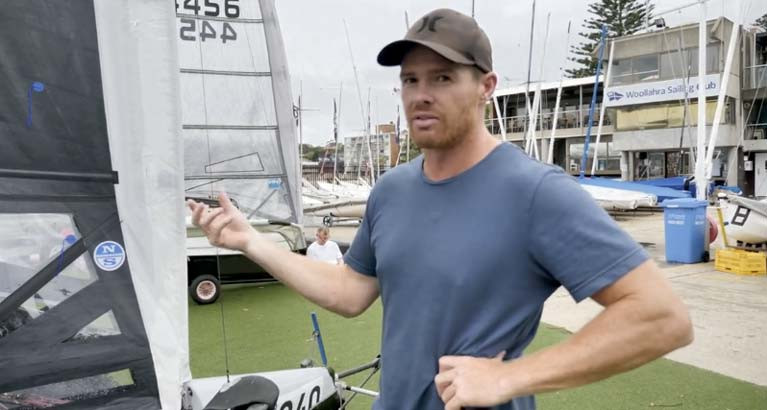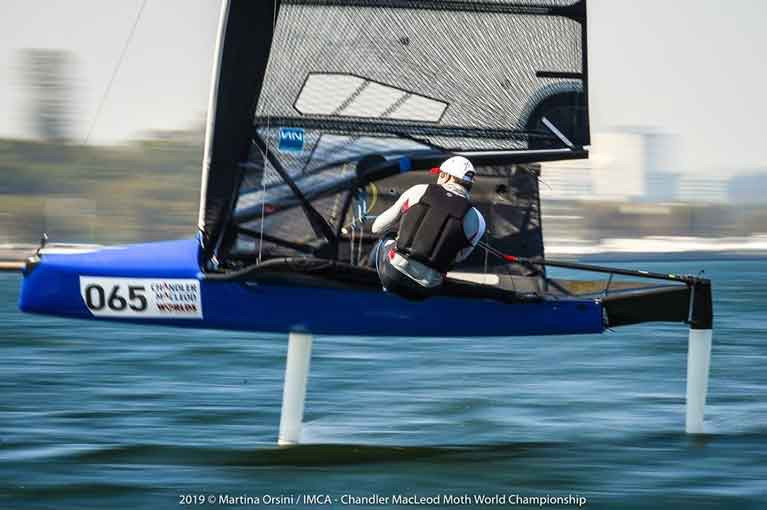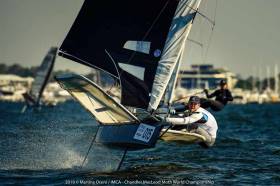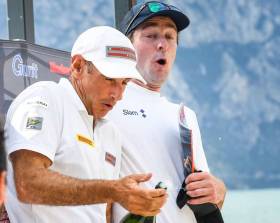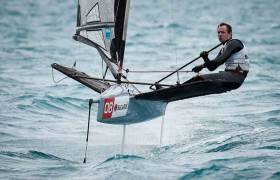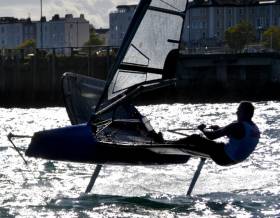Displaying items by tag: moth
19-Boat Foiling Waszp and Moth Fleet to Contest National Honours at Royal St. George Yacht Club
A 19-boat entry will contest the Waszp and Moth Irish National Championships at Dun Laoghaire Harbour's Royal St. George Yacht Club this weekend (August 19th and 20th).
For the first time in the burgeoning class, the entry list includes a strong Northern Ireland entry as the foiling fleet builds at Ballyholme on Belfast Lough, as Afloat reported here.
At least 30 Waszps are in Ireland this season, with a number of boats competing in Europe.
As both boat types need approximately ten knots to fully foil, all eyes are on the weekend weather forecast that looks promising for the Dublin Bay race track with plenty of strong southwesterly winds for Saturday at least.
The championship will consist of a maximum of eight races but up to a maximum of six races may be scheduled on any one day.
The target time for each of the Waszp National Championship races is approx. 20 minutes. For the Moth National Championship, the target time is approx 25 minutes.
2023 Moth World Championships Scrubbed After Just Two Races in Seven Days at Weymouth
It wasn’t supposed to go like this. After being initially postponed in 2020 for obvious reasons, the 2023 Moth World Championship at the Weymouth and Portland National Sailing Academy (WPNSA) should have been rewarded with the amazing South Westerly winds and perfect foiling conditions that Portland Harbour is renowned for. Instead, the high-pressure system that was locked over the UK provided fickle and feeble easterlies.
Two Irish helmsmen were competing, Ronan Wallace from Wexford and Paris 2024 Olympic trialist in the ILCA 7, Ewan McMahon from Howth.
In the end, after seven days, just two races were completed for the two qualifying groups. Principal Race Officer David Campbell-James did all he possibly could to run racing over the week, and the groups were alternately sent out into the harbour when conditions looked hopeful, once even managing a start which had to be abandoned after the first leg with half the fleet still languishing at the start line while the leader rounded the windward mark. It simply wouldn’t have been fair racing to let it run on.
Reducing the number of races needed to make this a valid championship was also looked at, but the consensus was that this wouldn’t have been satisfactory, and as the hours, minutes and seconds ticked by on the final day of the event, it became increasingly obvious that the 2023 Moth World Championship title wasn’t going to be awarded.
A low-key prizegiving was held at the WPNSA, which was understandably subdued, but there was a warm round of applause for all the volunteers who have given up their time to run the event. From mark layers, safety boats, the committee boat team, the dinghy park team, the caterers, and many more, they all got up for early starts and happily carried out their roles. For the organisers, this was an event five years in the planning, and they were understandably so upset that the racing was disrupted.
There was also a massive appreciation for all the sailors who had travelled from all corners of the world to compete. They’d invested time, effort, and money, and for the wind not to show up was cruel on everybody. The venue is fondly known as ‘Foiltown’ as it’s usually so reliable with its wind and perfectly flat water, but it was far from that last week.
It wasn’t all doom and gloom in Portland, and the chat and banter in the dinghy park was superb. Discussions about the class and developments were had aplenty, and many laughs shared. The class itself is in rude health, as demonstrated by the strong and deep entry list, and the range of new designs sailing. Very good second-hand boats are now available at more affordable price points, so there’s never been a better time to get into the class.
Video discussions were held with elder statesmen and female competitors at the event, which looked back at the beginnings of foiling, where the class is today and how it’s developing, as well as future training camps which can be such a good way of making your first steps in foiling sailing. These will be must-watch videos for years to come and have already led to much further discussion. The female contingent is not only strong, but also hugely proactive in encouraging and helping more sailors come into the class.
When it comes to the youth, a star is born in Jacob Pye. The 17-year-old Kiwi won the UK Open prior to the Worlds, and recorded first places in the two races he sailed at the World Championship. He’s grown up through the Starling, O’pen Skiff, 29er and WASZP classes and, together with fellow Manly Sailing Club youth sailors Mattias Coutts and Jack Bennett, we saw the next generation of foiling superstars this week.
There are many other young sailors coming up through the ranks as well, such as France’s Enzo Balanger who finished sixth overall, and Norway’s Nicolai Jacobsen in eighth.
So many champions from other classes are also drawn to the Moth, such as four-time Laser / ILCA 7 Olympian and reigning ILCA 7 World Champion Jean-Baptiste Bernaz from France, who finished second overall, Germany’s 2020 ILCA 7 World Champion Philipp Buhl who finished ninth, Rio 2016 Olympic champion Tom Burton from Australia who finished eleventh, and the USA’s Ravi Parent, who recently won both the A Class Catamaran and Formula 18 World Championship, finishing nineteenth.
Just as important are the weekend sailors, the homebuilders, and those just starting out on their foiling Moth journeys. They bring so much fun and energy to the class and ensure it will remain strong for years and years to come.
It was without doubt a difficult week for all, but the Moth class is as healthy as it has ever been. The sailors will all go home with new ideas and friends, the class will continue evolving, and the WPNSA will host many future events in perfect wind conditions.
An Irish Olympic campaigner is one of two Irish International Moth sailors are competing at the UK Open Championship 2023 Weymouth & Portland National Sailing Academy that concludes on Friday.
Paris 2024 ILCA 7 trialist Ewan McMahon of Howth Yacht Club is lying 30th in the near 100-boat fleet, and Wexford Harbour's Ronan Wallace is three places ahead on 27th.
It’s not just the temperatures that are hotting up in the UK right now; the foiling Moths in Weymouth have once again taken it to the next level ahead of the 2023 World Championship.
Leading the charge is a young group of Kiwis from Manly Sailing Club, who have been pushing each other daily just a few kilometres north of Auckland, New Zealand. Jacob Pye and Mathias Coutts won four of the eight races held today, in their respective groups, and it’s Jacob who leads the UK Open overnight.
"I'm very happy. Put in a great performance today!" said Jacob after racing. "I have to put it down to the group I'm sailing and training with all the time, a great bunch from New Zealand. There's been a lot of testing and training up to this point and it's really starting to pay off. It's great to put good scores on the board. I did the Australian Nationals against Tom Burton a couple of months ago, and to come back and show I've made an improvement is a great feeling."
Mathias Coutts was similarly pleased with his day, despite being black-flagged in his first race: “Definitely pleased with my pace. Great breeze, great racing out there, and lots of competitive boats. I was really happy with my speed. We've had a good group of us back home who train up together and share lots of information. I think we've really made some good progress as a team."
Another member of the Manly Moth team is Jack Bennett, who put in three top-three results:
"It's great to have a good team [of Kiwis]. I’m pretty happy with the results today, for sure! We certainly try to work as much as we can as a team. It's a benefit having three boats out on the water most days. It's really handy having the boys together.
"I loved it when the breeze came in a little bit more. We could get some high speeds. I loved it! Great fun, good racing. I think I clocked 30 downwind today, which was pretty good."
There was a particularly proud dad out on the water in a RIB, who has done more than his fair share of winning on the water over the years, and is very happy to see the next generation of sailing superstars launch themselves onto the international stage…
"It's a great group of three 17 year olds - it's pretty cool to see!" said Russell Coutts. On his son Mathias he added, "He had a good day today. He's been struggling a bit lately, so it was good to see him get out there and do well today."
Jacob Pye may be happy to be leading Olympic gold medallist Tom Burton, but the Australian sailor is just two points behind him in the standings:
"It seemed like a long day. Four ace races in an awesome breeze, flat water, what more could you ask for really?!
"If I got off the line in the front pack I felt like I could sail away a little bit, but I made some little errors in the starts and didn't get off the first two that great and there are guys that are plenty quick enough to sail away when other people are in gas; not much you can do really!
"The course was super right-hand dominant, but you didn't want to go too far because of that big ship in the way - you could get into a massive lull just at the tacking point. It would lure you in, but you could make a big mistake there. I think I gave away maybe two in the races, on the last downwind, doing something stupid."
Tom was sporting a particularly fetching hat on the water which he recently picked up: "New hat, yeah! I got it in Garda this year for cycling. I figured I'd take the aerodynamics to the next level."
In fourth place overall is the USA’s Riley Gibbs who is taking some time out from his America’s Cup duties:
"Yeah, it was a good shakedown day. It's nice to get some time off work, with support from NYYC American Magic to be here, and we want to represent our team the best we can."
"Since sailing the big boat [AC75] and AC40s we don't get much time to go Moth sailing, as much fun as it is, and as much as we enjoy the competition with our team mates!"
"We had just enough time to go through all our equipment in the lead up to this event, so are taking this as a 'learn as we go' regatta, then looking forward to the Worlds."
"Unfortunately I got a little greedy on the right-hand side of the track, underneath that ship, and dropped a tack; it was my race over. It is tight; if you miss a shift you're out the back. It's great racing - really high level."
The wind could be up a notch on Friday, which may mix things up a bit. What’s clear is that there are far too many sailors racing at the top of their game to give anyone a ‘favourite’ tag. It’s anyone’s game, but whoever wins the International Moth UK Open will take a big confidence boost into the World Championship.
Event report by Mark Jardine
Paris 2024 Olympic ILCA 7 campaigner Ewan McMahon has won the Irish Moth National Championships 2022, for the second year running.
This year, the Irish Moth Class partnered with the Irish Waszp Class to hold a joint national championships kindly hosted by the Royal St George Yacht Club in Dun Laoighaire.
The initial forecast for the weekend looked borderline, however, the two fleets enjoyed close-to-perfect foiling conditions and warm sunshine for the whole weekend, with Sunday being described as one of the best days foiling of the summer! The standard of sailing was certainly impressive in the Moth fleet this year with Ronan Wallace and Fionn Conway, each having just returned from the Moth Europeans in Brittany, France the week before, keeping the pressure on Ewan throughout the weekend. Similarly, Jim Devlin was flying fast throughout the event and showed the rest of us how to not only balance through a foil tack but also how to balance raising a young family and having the time to compete at the nationals!
 Irish National Moth Champion Ewan McMahon pictured centre Photo: Sean Hannon
Irish National Moth Champion Ewan McMahon pictured centre Photo: Sean Hannon
Race one took place after 11 am on Saturday, roughly between the harbour and Sandymount strand in a WNW 7-12 breeze, getting lighter and patchier closer to the windward mark and slightly more consistent towards the leeward and the finish. The Moths sailed three laps of a windward leeward course. Competitors had to ensure they sailed around the spreader mark, laid about 50 metres past the windward mark and then had to round the leeward mark to port and ensure to sail through the finish line before going back upwind again. This was to ensure the race committee could keep track of the fleet and results given the different speeds of the boats and the two fleets racing on the same course.
 Fionn Conway in a Mach 2.6 Photo: Sean Hannon
Fionn Conway in a Mach 2.6 Photo: Sean Hannon
As per Windguru's forecast, the wind promptly dropped after race one and filled in from the south with a lively 15 knots plus to get the second race off. The first windward mark saw the fleet get around fine however Ed Butler misjudged the rounding which led to a collision between the windward mark and his leeward shroud causing a massive pitch pole which bent his spreaders on impact. There was just one more race completed after race two with the fourth race being abandoned due to the dying sea breeze which couldn’t seem to fight of the westerly gradient. The sailors were greeted with a pasta dish to replenish the many burned calories followed by something to wash it down and a delicious meal altogether with the Waszp sailors and volunteers in the club.
 Jim Devlin in a Mach 2 Photo: Sean Hannon
Jim Devlin in a Mach 2 Photo: Sean Hannon
Sunday morning dawned earlier than usual with the target first gun being 10 am sharp. It was agreed by all that the best of the wind would be in the early morning so, without delay, the two fleets made their way out (half asleep!) to the start line which this time was about 800 metres directly out from the harbour mouth. The racing kicked off in a fantastic 12-16 knots from the west and the starts were even more competitive than the day before with all sailors hitting the line together at full speed. Fionn Conway, in his Mach 2, took a well-deserved race win in race six and the one Voodoo competing in the fleet, sailed by Ronan Wallace, was going exceptionally quick also. By the end of the seventh race, the decision to race early paid off as the wind began to get patchier and the moth sailors headed home on a high for more pasta and refreshments and craic.
 Ed Butler in a Mach 2
Ed Butler in a Mach 2
Thanks to Moselle Hogan and Tadgh Ó Braonáin who provided rescue on Saturday. Special mention goes to Moselle for her continued encouragement to the fleet generally and who made it out on Sunday in her Mach 2 to enjoy the thrill of foiling around Dublin Bay in the champagne conditions. Thanks also to Scott Flannigan for providing rescue and much-needed support to the Mothies on Sunday.
While the general consensus from both fleets was that the sailing was very physically challenging, everybody was delighted with the seven races meticulously organised, managed and executed by race officer Barry O'Neill and his team. Combining the two fleets certainly contributed to a more social weekend and atmosphere around the club.
All of the staff at the RStGYC were very welcoming on the lead up to and throughout the whole weekend and provided the sailors with a café, a bar and a restaurant, allowing for a real onsite feel to the event. A big mention and particular thanks to Henry Start, class captain of the Irish Waszp Fleet, for ultimately making the weekend happen.
North Sails Moth Masterclass From Rob Greenhalgh & Tom Slingsby (Worth Watching, No Matter What Boat You Sail!)
Tom Slingsby has won Olympic gold and numerous world titles in the Laser class. He has won the America's Cup as strategist with Team Oracle USA.
Last December, he flew his North Sails 3Di mainsail in a never seen before domination of the Moth World Championship
Rob Greenhalgh, now based in Sydney, is our North Sails Moth specialist. He himself has won numerous national and international titles (including the 2004 1720 Europeans!) and indeed represented Ireland as a member of Anthony O'Leary's "Antix" team in the 2008 Rolex Commodore's Cup. Rob is veteran of five Volvo Ocean races and was a member of the winning team in the 2005/6 edition on "ABN Amro 1".
North Sails Wins 2019 Irish Moth Nationals
Closer to home, Alistair Kissane from Howth Yacht Club (pictured below) won the 2019 Irish Moth nationals in Baltimore Sailing Club flying his North Sails Vi-8LA 3Di mainsail.
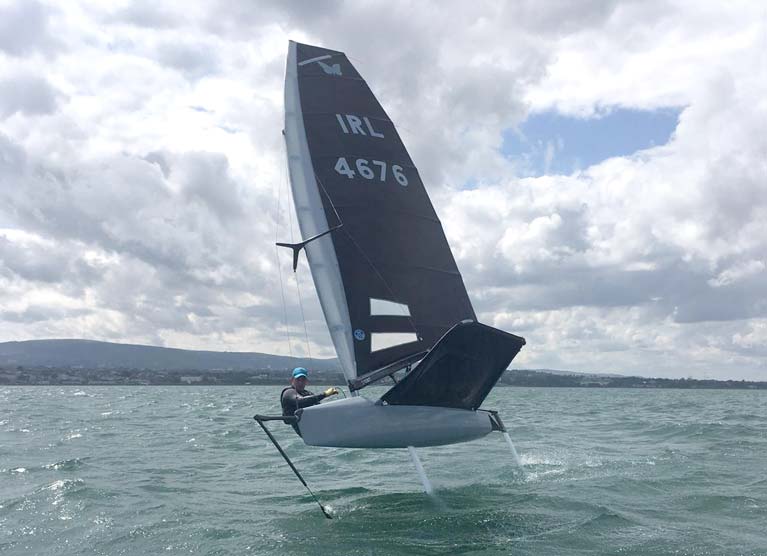 Alistair Kissane flying North Sails 3Di to win the 2019 Irish Moth Nationals in Baltimore SC
Alistair Kissane flying North Sails 3Di to win the 2019 Irish Moth Nationals in Baltimore SC
Please click on the link here to watch a fascinating North Sails video, narrated by Rob with special guest Tom Slingsby, on the technical aspects of setting up the new North Sails Vi-9DSX Moth sail and rig. No matter what boat you sail, this is well worth watching!
Join North Sails Moth Class Leader, National and European titleholder Rob Greenhalgh for the first of many live webinars, on Wednesday, March 25th at 8:00 pm GMT, register here
From all of us here at North Sails Ireland - stay safe and well.
Royal Cork's Kenefick 28th at Perth Moth Worlds
Royal Cork Yacht Club's David Kenefick has finished 28th and fifth nation at the Moth Worlds in Perth, Western Australia.
As Afloat reported earlier, the Cork Harbour sailor was one of two Irish helms competing. Also racing was the National Yacht Club's, Fionn Conway from Dublin Bay.
In general, it was a windy regatta with 'extremely tough competition', according to Kenefick.
With much more interesting breeze conditions, the final day of the 2019 Chandler Macleod Moth Worlds saw a real shake up on the course.
The battle for second place was on between Kyle Langford and Tom Burton after Tom Slingsby took out the overall championship after yesterday with two races to spare.
The day's racing was live-streamed by Down Under Sail and supported by broadcast partners CST Composites and Mach2 Boats, with Slingsby keeping his Moth under cover and joining the media team in the commentary box for the day.
In the first race, Langford was slow off the start line and struggled in the lighter winds after deciding to sail with a bigger foil.
After the first upwind leg he was caught in no wind and was unable to get the boat foiling, leaving himself out the back and giving Burton the opportunity to strike.
But both sailors ended up dropping the race with Burton finishing in 14th, leaving the battle to be decided in the final race where Burton needed to win with Langford in sixth or worse to claim the runner up honours.
The day proved to be a better one for the Europeans with lighter conditions helping Italian Francesco Bruni to a 1-2 and moving into fifth position overall.
The next World Championships are in Weymouth in September 2020, a venue much closer to home that may encourage a bigger Irish entry.
Final top ten:
1. Tom Slingsby, AUS, 14 points
2. Kyle Langford, AUS, 28
3. Tom Burton, AUS, 34
4. Scott Babbage , AUS, 47
5. Francesco Bruni, ITA, 52
6. Brad Funk, AUS, 72
7. Robert Greenhalgh, AUS, 75
8. Matthew Chew , AUS, 76
9. Thomas Johnson , AUS, 104
10. Josh Mcknight, AUS, 107.3
Two Irish Sailors Contest Moth Worlds in Perth
Two Irish sailors are contesting the Moth Worlds in Perth, Western Australia. After nine races sailed Royal Cork's David Kenefick was lying 28th and Fionn Conway 38th of the National Yacht Club in the 61-boat fleet at Mounts Bay Yacht Club.
It was all to play for on Sunday with positions very much up for grabs to make the cut for Gold fleet racing.
Both Kenefick and Conway contested Lake Garda foiling week in July with Cork Harbour's Kenefick making the podium.
The fleets will be split for Monday's finals racing allowing the first chance to see the best sailors all on the same course for the first time.
It will be the first time since the nationals that we will see some sailors on the same course, with Tom Slingsby (AUS) putting on a clinic on the Yellow course, while Tom Burton (AUS) and Kyle Langford (AUS) have been duking it out on the Blue course.
Slingsby solidified his position as the championship favourite after a stellar effort today that saw him claim three race wins from as many races, with plenty of daylight behind him in most instances.
His nearest competitors Francesco Bruni (ITA), Brad Funk (USA) and Matthew Chew (AUS) all had solid days as well, but were just unable to get near the current SailGP champion helm.
Results are here
Royal Cork Yacht Club's David Kenefick has more than got the upper hand on these latest foiling techniques and chalked up another significant result at International Foiling Week on Lake Garda at the weekend.
Regular Afloat readers will recall that the former Figaro solo sailor who switched to the International Moth dinghy in 2016 was a creditable 11th at the Moth Worlds in Bermuda a year ago.
Now the Cork Harbour sailor has posted a third from 83 at the biggest European Moth event at his favourite Italian venue.
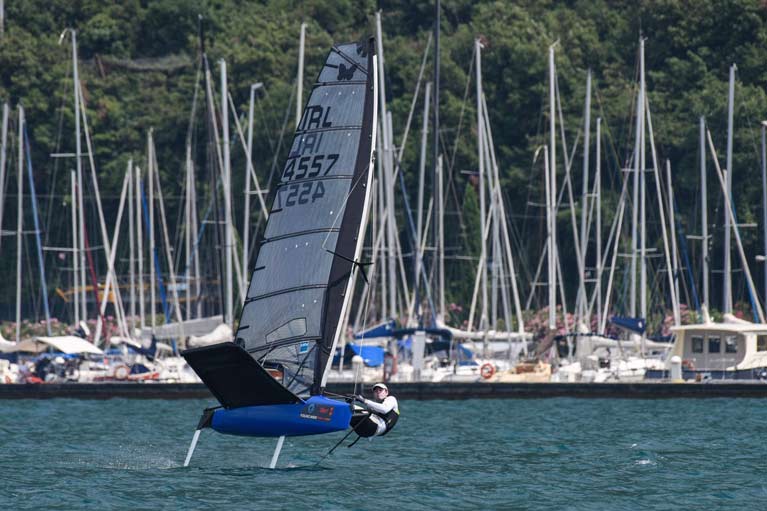 Kenefick in perfect balance at Foiling Week on Lake Garda. Photo: Martina Orsini
Kenefick in perfect balance at Foiling Week on Lake Garda. Photo: Martina Orsini
Kenefick will be back on Irish waters next month for the Irish nationals at Baltimore, West Cork from the 9-11 August.
Other Irish in Lake Garda included Alistair Kissane, from Howth Yacht Club, who took an impressive eighth overall. Kenefick's clubmate, Cian Byrne was 23rd. Ireland's Fionn Conway sailing 'Paddy' from the Dubai Offshore Sailing Club was 33rd.
Results are here
After four races sailed on day two at the International Moth Championships in Portugal at Clube de Vela de Lagos Royal Cork Yacht Club's Dave Kenefick is top of three Irish sailors competing in the 47-boat fleet in eighth place overall.
The National Yacht Club's Rory Fitzpatrick is 11th and Cian Byrne is 37th.
Overall, Francesco Bruni of Italy has a 10 point lead. Bruni (1,1,2,1) has 5 points after four races and leads from Britain's David Hivey (2,3,9,2) on 16 points and Ross Harvey (13,4,7,3) on 27 points.
Brad Funk of the USA started well with a 3 and 2, and a win in race 3, but then failed to finish race 4, which places him down in 14th place until the first discard kicks in.
Results are here.
Royal Cork's Davy Kenefick Wins Irish Moth Title on Dublin Bay
Ten boats were entered for this year's International Moth National Championships, held at the Royal St George Yacht Club in Dun Laoghaire on Dublin Bay.
Starting with three races on a chilly Friday afternoon, in light, north to northeast winds and lumpy seas off the west pier in Seapoint bay. Royal Cork's Davy Kenefick set the tone early with three straight wins. Cian Byrne showed his talent with a similarly consistent string of second places - not bad after just six months moth sailing! Ali Kissane made dad & OOD Richard proud, with three third places in dying wind in his brand new Irish built 'Voodoo' Moth. With the wind gone, the fleet retired to a local eatery for some well deserved R&R.
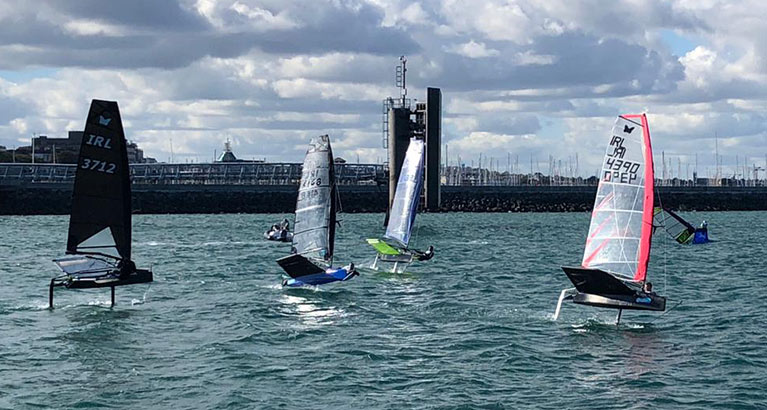 The Irish Moth Nationals took place at the Royal St. George Yacht Club
The Irish Moth Nationals took place at the Royal St. George Yacht Club
Saturday dawned with fresh northerly winds and Race Officer Con Murphy took the responsible decision to run racing in the harbour, achieving a reasonable race-track set up for both Moths and Wazsp Fleets. Five quick races were run off in three hours in 18-23knts with a nasty lump on the surface. The conditions took their toll on all sailors and their equipment. Event leader Kenefick had a big stack at the first windward mark going through his sail in the process which allowed Cian Byrne the break he needed to get few bullets under his belt while Kenefick went ashore to change sails.
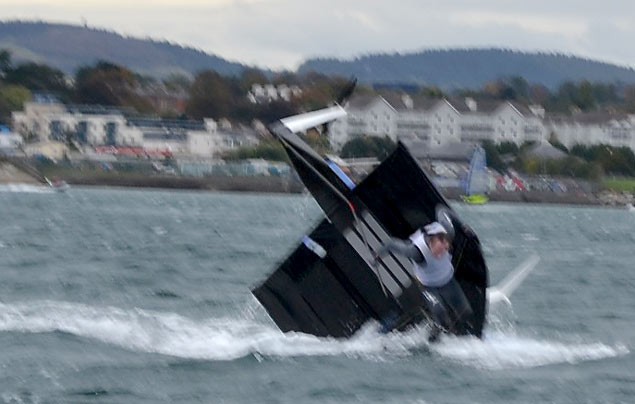 A shaky race course photo records a wipeout for Kenefick in breezy and lumpy conditions on Scotsman's Bay
A shaky race course photo records a wipeout for Kenefick in breezy and lumpy conditions on Scotsman's Bay
After the dust settled, it was close at the top between the two Cork sailors with Jim Devlin, recovering from a rudder issue to claim third. Laser Ace, Ronan Wallace put in a robust effort with a pair of seconds in that challenging breeze.
All down to the final day and mother nature wanted her say - a strong and gusty 15-25knt south-west wind facilitated four more races in the flat seas of Seapoint Bay. Waszps and KONA windsurfers shared the course on the final day to spice up the atmosphere.
"A controversial ninth race saw leeward mark drifting issues"
A controversial ninth race saw leeward mark drifting issues combined with strong squalls on the downwind leg allowing Kenefick come out on top after all the leading group capsized and recovered with varying degrees of success. With Byrne retiring to shore to carry out some quick repairs soon after the start of race 10, the event was left for Kenefick to take advantage of his luck and foil on to victory - but only after Ali Kissane took a well-deserved race 10 off him and his fancy new British built 'Exocet' moth.
So it was Kenefick, followed by Byrne, sailing an Australian built standard Mach2 moth in second, and a well deserved consistent Jim Devlin in third with 27 knots reading on his speed puck, also sailing a Mach 2.



























